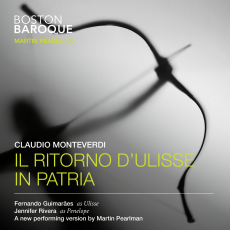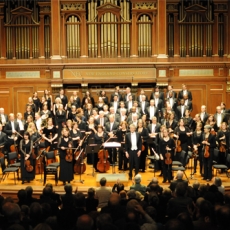Boston Baroque - Monteverdi: Ulisse - All About Jazz
The hinges of musical history have typically afforded one or two artists most associated with them. At the horizon of the Renaissance looking over into the Baroque period was Italian composer Claudio Monteverdi (1567-1643). He is often credited with developing polyphonic performance at the end of the Renaissance period and the basso continuo technique (establishment of a harmonic underpinning) in the Baroque period. New York Times classical music critic Harold Schonberg called Monteverdi, the "Pioneer of Opera," as his L'Orfeo (1607) being one of the first operas composed.
Monteverdi is best remembered for his nine books of Madrigals (1538-1651), his sacred music, particularly Vespro della Beata Vergine, 1610, and his eighteen operas, of which only three have survived in completion: L'Orfeo, SV 318 (1607), Il ritorno d'Ulisse in patria, SV 325 (1639), and L'incoronazione di Poppea, SV 308 (1643). Joining Nikolaus Harnoncourt's Das Alte Werk and Rene Jacob's Harmonia Mundi releases is Martin Pearlman's Il ritorno d'Ulisse in patria with the Boston Baroque. Pearlman's performance is based on his newly minted edition of the work, easily the least appreciated of Monteverdi's extant operas.
The libretto of Il ritorno d'Ulisse in patria (The Return of Ulysses to his Homeland), written by Giacomo Badoaro (1602-1654). It originally consisted of a prologue and five acts eventually shortened to three acts. The plot, taken from the second half of Homer's Odyssey, recounts how persistence and virtue are ultimately compensated, treachery and deception overcome in the story of the return home of Ulisse (Greek: Odysseus, Latin: Ulysses) king of Ithaca, to his faithful queen, Penelope. Pearlman's performance is sprawling, consuming three compact discs and 176 minutes in the bargain. While no Parsifal it still remains a lengthy listen.
After a long tenure with Telarc Classical, where they recorded a basic Baroque repertoire, Pearlman and the Boston Baroque moved to Linn Records, where the present recording is their third for the label, after Haydn's The Creation (2012) and Lord Nelson Mass (2013). Having sailed as far as the classical era, Pearlman and company double back to Monteverdi. The group's 1998 recording of Vespers of 1610 (Telarc) won a Grammy for Best Performance of a Choral Work. The present Il ritorno d'Ulisse in patria represents a doubling down of creative effort regarding the historically-informed performance and Pearlman's newly minted edition of the opera.
Considered one of the first "modern operas," Il ritorno d'Ulisse in patria sports a large cast, principles being tenor Fernando Guimaraes in the role of Ulisse and mezzo-soprano Jennifer Rivera whose performances are sculpted as much from academic study as sheer talent. When listening, it is easy to hear that this is neither Baroque nor Classical opera. It retains a fragrance of the Renaissance evident in Vespers of 1610 and from the work of earlier Renaissance composers like Palestrina (1525-1594), Lassus (1532-1594), and Gabrieli (1514-1612). In the same way that period performance of Beethoven more clearly illustrates that composer's influence by Haydn and Mozart, predating the Romantic Era so does Monteverdi's foreshadowing of the Baroque in the back shadow of the Renaissance.
Pearlman provides modern audiences with a unique view of early music. As no art is developed in a vacuum, the vast influence of Monteverdi on all that came after is amply illustrated on this fine recording.

